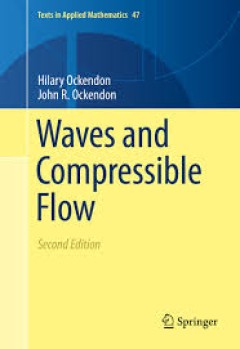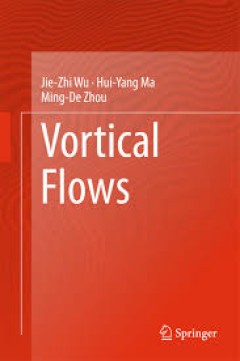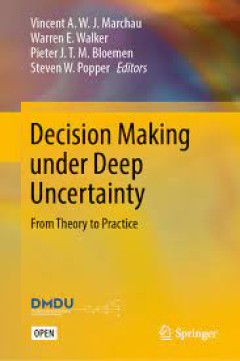Filter by

Statistical energy analysis of dynamical systems :theory and applications
"This is the first full exposition in print of a subject in whose development over the past fifteen years the author has been a prime participant. As an approach to the study of mechanical vibrations, statistical energy analysis (SEA) has found new applications and adherents with each passing year. The name SEA was coined to emphasize the essential feature of the approach: "Statistical" indicat…
- Edition
- -
- ISBN/ISSN
- 9780262310970
- Collation
- 1 online resource (388 pages) :illustrations
- Series Title
- -
- Call Number
- -

Waves and Compressible Flow
Now in its second edition, this book continues to give readers a broad mathematical basis for modelling and understanding the wide range of wave phenomena encountered in modern applications. New and expanded material includes topics such as elastoplastic waves and waves in plasmas, as well as new exercises. Comprehensive collections of models are used to illustrate the underpinning mathematic…
- Edition
- -
- ISBN/ISSN
- 978-1-4939-3381-5
- Collation
- -
- Series Title
- -
- Call Number
- -
Wafer-Level Chip-Scale Packaging Analog and Power Semiconductor Applications
Analog and Power Wafer Level Chip Scale Packaging presents a state-of-art and in-depth overview in analog and power WLCSP design, material characterization, reliability and modeling. Recent advances in analog and power electronic WLCSP packaging are presented based on the development of analog technology and power device integration. The book covers in detail how advances in semiconductor conte…
- Edition
- -
- ISBN/ISSN
- 978-1-4939-1556-9
- Collation
- -
- Series Title
- -
- Call Number
- -

Vortical Flows
This book is a comprehensive and intensive book for graduate students in fluid dynamics as well as scientists, engineers and applied mathematicians. Offering a systematic introduction to the physical theory of vortical flows at graduate level, it considers the theory of vortical flows as a branch of fluid dynamics focusing on shearing process in fluid motion, measured by vorticity. It studie…
- Edition
- -
- ISBN/ISSN
- 978-3-662-47061-9
- Collation
- -
- Series Title
- -
- Call Number
- -

Vortex Rings and Jets Recent Developments in Near-Field Dynamics
In this book, recent developments in our understanding of fundamental vortex ring and jet dynamics will be discussed, with a view to shed light upon their near-field behaviour which underpins much of their far-field characteristics. The chapters provide up-to-date research findings by their respective experts and seek to link near-field flow physics of vortex ring and jet flows with end-applica…
- Edition
- -
- ISBN/ISSN
- 978-981-287-396-5
- Collation
- -
- Series Title
- -
- Call Number
- -

Visualization of Conventional and Combusting Subsonic Jet Instabilities
Based on new information obtained on free microjets, this book explains the latest phenomena in flame evolution in the presence of a transverse acoustic field with round and plane propane microjet combustion. It gives an overview of recent experimental results on instability and dynamics of jets at low Reynolds numbers and provides the reader, step by step, with the milestones and recent advanc…
- Edition
- -
- ISBN/ISSN
- 978-3-319-26958-0
- Collation
- -
- Series Title
- -
- Call Number
- -

Visible and Invisible The Wonders of Light Phenomena
Light phenomena have intrigued humankind since prehistory. Think of the rainbow, a sunset on the sea, a game of shadows. Humans have always used light for their own needs, from cooking food to illuminating a room. However, light is not only limited to what we can see with our eyes. The invisible part of the electromagnetic spectrum is broad and dynamic. This book outlines the mysteries and w…
- Edition
- -
- ISBN/ISSN
- 978-3-319-09825-8
- Collation
- -
- Series Title
- -
- Call Number
- -

Decision Making under Deep Uncertainty from Theory to Practice
This open access book focuses on both the theory and practice associated with the tools and approaches for decisionmaking in the face of deep uncertainty. It explores approaches and tools supporting the design of strategic plans under deep uncertainty, and their testing in the real world, including barriers and enablers for their use in practice. The book broadens traditional approaches and too…
- Edition
- -
- ISBN/ISSN
- -
- Collation
- -
- Series Title
- -
- Call Number
- -

Phenomenological Structure for the Large Deviation Principle in Time-Series S…
This thesis describes a method to control rare events in non-equilibrium systems by applying physical forces to those systems but without relying on numerical simulation techniques, such as copying rare events. In order to study this method, the book draws on the mathematical structure of equilibrium statistical mechanics, which connects large deviation functions with experimentally measureable…
- Edition
- 1
- ISBN/ISSN
- 978-981-287-811-3
- Collation
- Fisika
- Series Title
- -
- Call Number
- 530
Analysis of Geometric Parameters of the Nozzle Orifice on Cavitating Flow and…
- Edition
- -
- ISBN/ISSN
- 978-1-83968-247-6
- Collation
- -
- Series Title
- -
- Call Number
- -
 Computer Science, Information & General Works
Computer Science, Information & General Works  Philosophy & Psychology
Philosophy & Psychology  Religion
Religion  Social Sciences
Social Sciences  Language
Language  Pure Science
Pure Science  Applied Sciences
Applied Sciences  Art & Recreation
Art & Recreation  Literature
Literature  History & Geography
History & Geography